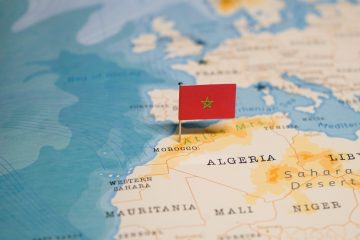
The Moroccan moment: Global engagement and domestic reform
The Moroccan moment: Global engagement and domestic reform Over the past decade, Morocco has revamped its international engagement, aligning it with its economic growth and domestic reforms. Morocco is committed to consolidating its status as a multipolar actor on the international stage. Moving beyond aid dependency, Morocco is firmly committed to fostering equitable partnerships with the global community. The nation’s strong commitment to expanding its trade partnerships and engaging with a wide range of stakeholders clearly reflects its enthusiastic pursuit of multilateral prominence on the global stage. The hosting the International Monetary Fund (IMF) – World Bank 2023 annual meeting in Marrakech in October was a keystone in this transformation. This article summarises a comprehensive report focusing on Morocco’s interactions …
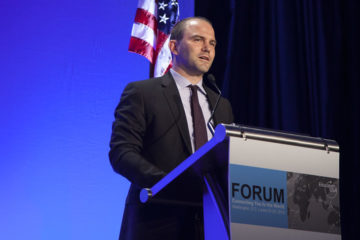
We Used to Do Big Things – A Review of After the Fall: Being American in the World We’ve Made by Ben Rhodes
Barack Obama’s 2008 campaign undoubtedly inspired a movement of young progressives across America, and few believed in the sprawling idealism more than Ben Rhodes, a young New Yorker who ultimately rose to become Obama’s Deputy National Security Advisor. It is this proximity to power, especially during a historic presidency, that makes Rhodes’ second book, After the Fall: Being American in the World We’ve Made, worth considering. After the Fall centers on an author grappling with a reality—in America and across the world—that has shaken his faith in the “happy democratic endings” he and Obama once held as an ultimate goal. Based on a four-year, cross-continent journey, he explores politics from Russia and Hungary to China and Hong Kong to trace …
October Surprise: How Foreign Policy Can Shape US Presidential Elections
The president’s recent diagnosis with Covid-19 sent the US presidential election race into a tailspin. As Donald Trump and Joe Biden jockey to regain control of the media narrative at a crucial phase of the campaign, speculation about a possible “October surprise” is widespread. Today, the term refers to any news story that breaks late in an election cycle and has the potential to affect the outcome of the election. Yet its origins are firmly rooted in foreign policy. In particular, the phrase describes a sitting president’s alleged propensity to manipulate events to boost their electoral prospects. The president’s recent tweet calling for all remaining US forces in Afghanistan to return home by Christmas has fueled suspicions that Trump is playing politics …

The Rightward Shift of U.S. Foreign Policy Didn’t Start with Trump
The recent confirmation of Mike Pompeo as Secretary of State by the Senate symbolizes that nationalist “hawks” dominate the Republican Party’s foreign policy. Even the famously non-interventionist Republican Senator Rand Paul supported his nomination. Pompeo’s quick and frictionless confirmation points to a shift to the right in what constitutes “common-sense” in US foreign policy. However, as this article will argue such changes in US foreign policy have predated Pompeo’s nomination and even President Trump’s election. Mike Pompeo, who came to Congress with the Tea Party movement in 2010, is an interventionist of the America-First variety. He desires strong sanctions on North Korea, Iran and Russia, supports extra-legal military strikes in areas of jihadist activity, and deeply distrusts China’s economic and …
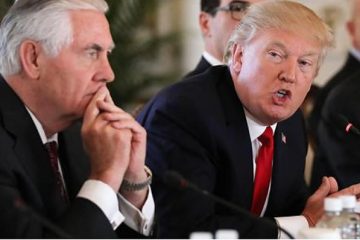
Trump & Tillerson: The End of a Rocky Relationship
In yet another major shake up of his administration, Trump, via Twitter, has declared that he will be replacing Secretary of State Rex Tillerson after only fourteen months, the shortest occupation of the position in modern history. Tillerson will be replaced by CIA Director Mike Pompeo after months of both public and private disputes between the former head of Exxon Mobil and the US President. Administration officials have claimed Tillerson was unaware of his imminent release, allegedly learning only briefly of his impending firing. For those who have been keeping up to date with the inner machinations of the controversial administration, it is concurrently unsurprising that Tillerson has met this fate, and surprising that it has taken this long. The …
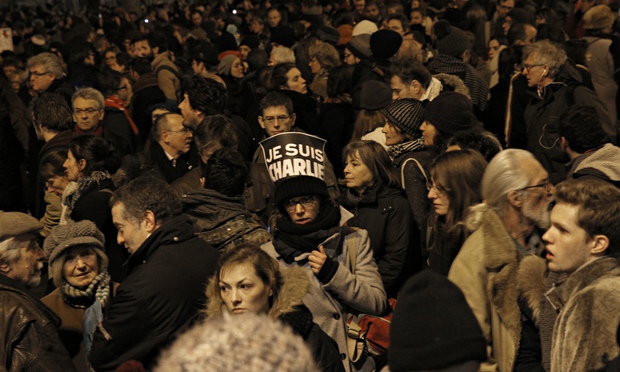
‘Charlie Hebdo’ and the end of the French exception
Today many are asking why Parisians have been attacked in their own city, and by their own people. But for many years the question for those following the issues of foreign policy and religion was why France had suffered so little terrorism in comparison to other European states. After the bombs on the Paris Metro and a TGV line in 1995, there were no significant Islamist attacks until the fire-bombing of the Charlie Hebdo office in November 2011, and the killings of three French soldiers (all of North African origin) and three Jewish children (and one teacher) by Mohamed Merah in Toulouse four months later. These attacks turn out to have been a warning of things to come.
But why was France free of such attacks for over fifteen years, when Madrid and London suffered endless plots and some major atrocities? Given the restrictions placed by successive governments on the foulard (headscarf) and the burka, together with the large French Muslim population (around 10% of the 64 million total), the country would seem to have been fertile ground for fundamentalist anger and terrorist outrages.
One view is that the French authorities were tougher and more effective than, say, the British who allowed Algerian extremists fleeing France after 1995 to find shelter in the Finsbury Park Mosque — to the fury of French officials. Another line is that the French secular model of integration, with no recognition of minorities or enthusiasm for multiculturalism, did actually work. Thus when riots took place in 2005 the alienated youth of the banlieues demanded jobs, fairness, and decent housing — not respect for Islam or Palestinian rights.
A third possible explanation of the long lull before this week’s storm is that French foreign policy had not provoked the kind of anger felt in Spain and Britain by their countries’ roles in the Iraq war, which France, Germany, and some other European states had clearly opposed. Although France had an important role in the allied operations in Afghanistan, its profile was not especially high. Given the slow-changing nature of international reputations the image of France as a friend of Arab states and of the Palestinians endured, while Britain drew hostile attention as the leading ally of the United States in the ‘war against terror’. France, again unlike Britain and the United States, has tended to be pragmatic in negotiations with those who have taken its citizens hostage abroad, facilitating the payment of ransoms and getting them home safely. Its policy was that payments, and the risk of encouraging further captures, were preferable to providing the Islamists with global publicity.

Tehran 2012: From the Axis (of evil) to the Non-Aligned Movement
After long years of silence and quiescence, the Non-Aligned Movement gained momentum in the debate about global governance and the management of alternative strategies of engagement with the world of international affairs. The setting was an unusual one per se, suggesting that the 16th gathering of the NAM was likely to be of a different nature. Indeed, Tehran, during the heated summer of 2012, seemed to be one of the less aligned capitals of the world, for a number of issues, widely debated in political science circles as well as among foreign policy decision-makers. Crippling sanctions, shadow negotiations and an on-going regional conflict in the Middle East, with several branches developing in Syria, Lebanon, Bahrain and perhaps Yemen, have put …
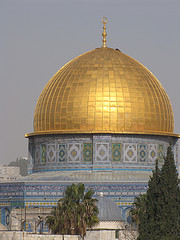
Preventing progress in Palestine: Israel must do more to break the deadlock
In Israel and the Palestinian territories, decades of conflict have not offered ripe soil for mutual understanding and peace on reasonable terms. Endless confrontation has eroded hopes for successful negotiations. Nonetheless, the frequent reference to a ‘status quo’ in the Israeli-Palestinian conflict is mistaken – in my opinion, it’s pure political rhetoric and this conflict is anything but one of attrition. Every day, new settler houses are being built in the West Bank and east Jerusalem – on Palestinian land. Everyday bricks are added to the anti-terrorist fence (or apartheid wall, as some call it), thereby outcasting communities of shared history, as well as hindering commerce and splitting communities (and families) apart. The Israeli government, meanwhile, has authorised the building …









